16
THE LAND OF MILK AND HONEY
If I had wings, I would fly.
An elderly woman returning to her home after
decades of being forced to live in the homeland of Bophuthatswana,
to which she had been removed under grand apartheid’s social
engineering.

22 April 1994
On the day of Ken’s funeral, I underwent my fifth
operation in five days. It was difficult to concentrate and even
more so to differentiate between reality and hallucination. My
points of reference were the operations: the surgeon would loom
over me saying that the flesh around the wound had continued to die
off, and that he needed to operate yet again. The nauseating
gurney-ride through the corridors to the operating-theatre would
dissolve and the next lucid moment was one of emerging from the
anaesthetic, pain eating into my chest, until the next blessed
injection of morphine would ease me back to a dissociated, narcotic
world.
Every day, friends would come visit, but the stream
of visitors blurred. I forgot who came to see me, and what they
said, what I said. I was drifting between substance and illusion.
But there was one moment of absolute clarity, when Ken’s mother,
Geri, came in with a bunch of red roses from the funeral, their
buds on the point of opening, and said, ‘Ken would have wanted you
to have these.’ Though I don’t
particularly like roses, I kept them for months.



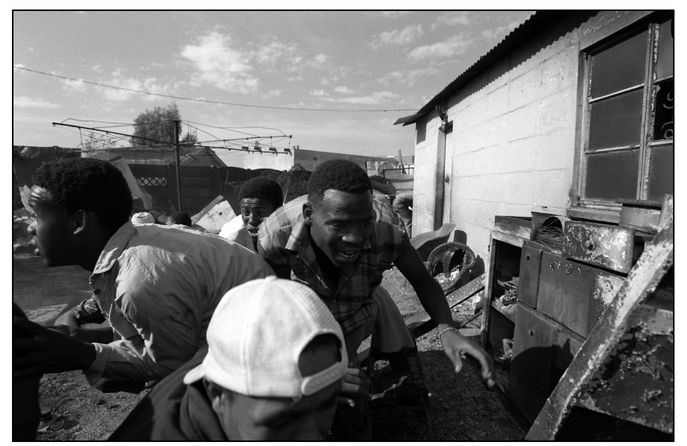

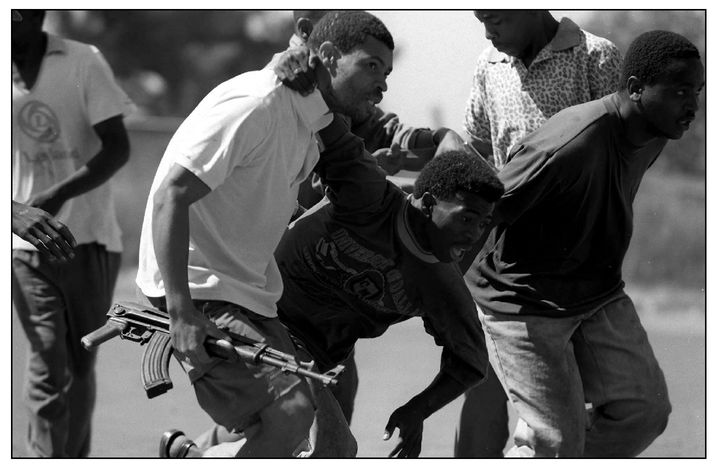


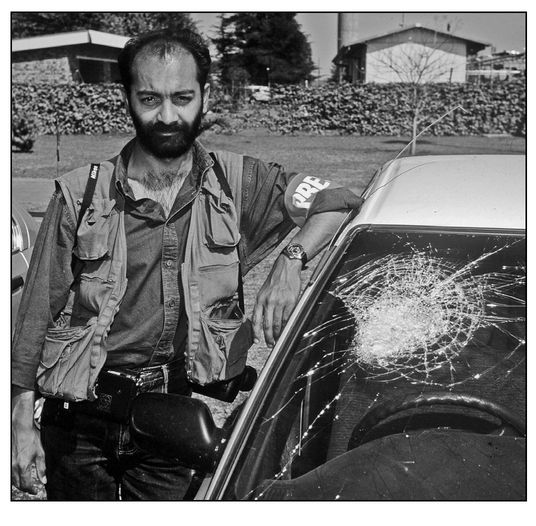
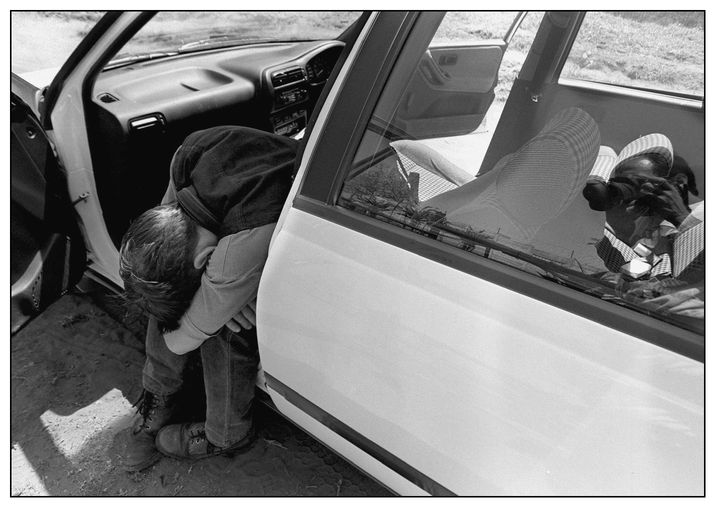



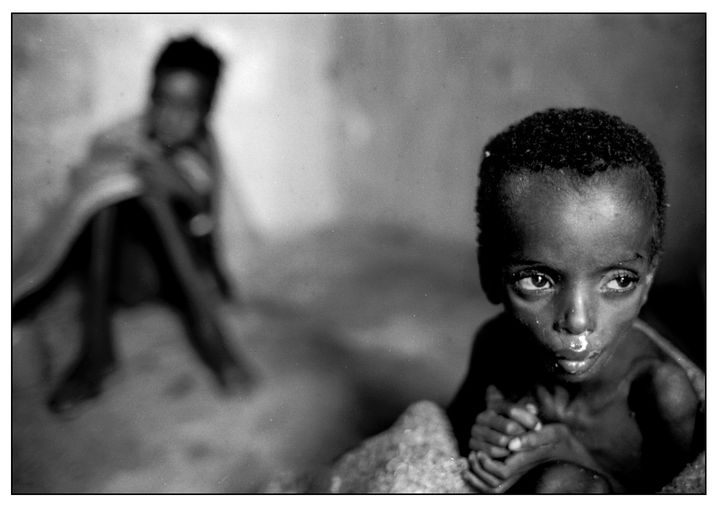



Alwyn Wolfaardt, a member of the extreme
right-wing Afrikaner movement (the AWB) begs for his life shortly
before being executed by a Bophuthatswana policeman after an
abortive attempt to prop up the tyrannical regime of the homeland
of Bophuthatswana, March 1994. (Kevin Carter/Corbis Sygma)

Journalists run from the scene of the execution of
the AWB members, March 1994. (Greg Marinovich)

A young boy races past the words ‘No Peace’ in the
dead zone near Thokoza’s Khumalo Street, shortly before South
Africa’s first non-racial election in April 1994. (Joao
Silva)

ANC self-defence-unit members duck gunfire during
a clash with Inkatha militants from the hostels and houses of
‘Ulundi’ in the dead zone near Khumalo Street. (Joao Silva)

ANC fighters carry a wounded comrade, spouting
blood from his side, during an attack on the Inkatha stronghold of
Mshay’zafe Hostel in Thokoza on 19 April, 1994 - the day after Ken
Oosterbroek was killed in the same area. (Joao Silva)

ANC fighters with an AK-47 carry a wounded comrade
during an attack on the Inkatha stronghold of Mshay’zafe Hostel in
Thokoza. (Joao Silva)

A wounded Greg Marinovich is assisted by James
Nachtwey, while Joao Silva takes pictures of Gary Bernard and an
officer from the National Peacekeeping Force as they carry the
fatally wounded Ken Oosterbroek in the background, 18 April 1994,
Thokoza. (Juda Ngwenya / Reuters)

An officer with the National Peacekeeping Force
assists Gary Bernard with a fatally wounded Ken Oosterbroek. (Joao
Silva)

Abdul Shariff, photographed in 1993 next to his
car, which was damaged during township clashes. Abdul was killed in
cross-fire between ANC and Inkatha militants in Kathlehong township
on 9 January, 1994. (Kevin Carter)

An exhausted Gary Bernard during a break from
covering violence after South Africa’s first democratic election in
1994. (Joao Silva)

Left:
A Serb woman lies dead in the snow just hours
after she was given protection by Croat soldiers during an
offensive on 26 December, 1991 after Croat forces retook parts of
the Papuk mountains - traditionally an ethnically mixed area. Some
Croatian units were trying to protect civilians (as in the case of
this woman) but others were intent on killing them. (Greg
Marinovich)

Below:
An Afghan man carries his fatally wounded son into
the hospital in Kabul after an artillery attack on their
residential neighbourhood, 1994. (Joao Silva)

Right:
A Somali woman weeps as her child dies in her arms
at an NGO centre in the town of Baidoa where thousands died of a
war-induced famine in 1992. (Joao Silva)

Below:
A starving and ill Somali child waits to die in an
NGO centre in Baidoa. This room was for children who were too far
gone for the aid workers to waste precious food and medicines on
them. (Greg Marinovich)

A colleague reaches to assist Greg Marinovich,
wounded by police during confrontations between police and
‘coloured’ residents of Westbury, Johannesburg, who were protesting
alleged discrimination by the newly elected majority black
government, September 1994. (Joao Silva)

Greg Marinovich being assisted to a South African
armoured vehicle after being shot in Lesotho, September 1998, when
the South African forces went in to quell a coup, and met stiff
resistance from BaSotho troops. (Joao Silva)
After two further operations I was finally able to
move out of intensive care. The crisis to survive was over and I
began to fret about missing the most important story of my life:
Inkatha’s final inclusion in the electoral process, which required
the last-minute application of stickers bearing the beaming face of
Inkatha’s leader Mangosuthu Buthelezi and the Inkatha symbol on to
the bottom of the lengthy ballot papers, a reminder of how close we
had been to civil war. Inkatha’s participation had at length been
secured by means of gerrymandering in their Zulu heartland, which
would ensure them a majority there. It was a small price to pay to
avert disaster, but the deal did not please those right-wing whites
and security force elements who had thought that they could use
Inkatha as part of their strategy to preserve white power. Every
day, explosions reverberated through the Reef cities, a last
attempt by the right-wing to derail the elections.
Every afternoon and evening my ward was a meeting
place for dozens of photographers, journalists and friends. People
started bringing food. When Joao and the others came to visit after
a day in the townships, they would always find a crowd already
there. It was like a subdued party to celebrate that we were still
alive and to forget the sad times which surrounded us, if only for
a while. Late one night I was already asleep when Ingrid Formaneck
and Cynde Strand from CNN crept in, wearing blonde big-hair wigs.
Soon we were giggling and laughing, and the night-sister, having
taken one look at us, retreated without a word to her
station.
One day Kevin visited. His face was mobile and his
eyes would not meet mine for more than an instant. ‘I’ve got your
cameras - I’ve borrowed them.’ I said fine, but I was surprised. I
could not understand why he was acting so strangely - our
friendship was such that he knew that I would have lent him the
equipment without hesitation, as he would have lent me whatever I
needed. Perhaps he had been in a rush when he told me, but he must
have known how upset I was at not being able to shoot the elections
I had waited so many years for - what it meant to me to be stuck in
hospital while everyone else was out
shooting pictures. And here he was, taking the cameras I should
have been using, without even a word of consideration. It was
unusually insensitive of Kevin. I was also puzzled by the fact that
he did not visit me as often as the others. Deep down, I had the
feeling Kevin was avoiding me, but I couldn’t understand why.
In that period Kevin was confused and angry. In the
space of just two weeks, he had been arrested for drunken driving,
kicked out by his girlfriend, lost his job, won a Pulitzer, been
reinstated in his job, only to have his best friend killed. Kevin -
and the rest of us - were convinced that Reuters had only rehired
him because of the Pulitzer. This was not Reuters’ version of
events, but Kevin was deeply angry with them and the relationship
was clearly poisoned. I suggested he try the AP and they readily
agreed to take his pictures, even though his name was at that time
associated with Reuters - the wire constantly needed to be fed
pictures. So, just a few days before the election, Kevin resigned
from Reuters, and did a couple of freelance jobs for the AP, but
then Mikey got him a more regular gig with the French wire service
Agence France Presse, and so it was for AFP that he covered the
election.
But Kevin was struggling with more than just
employment. I heard that he had started saying, ‘It should have
been me instead of Ken who took the bullet,’ though he never said
anything of the kind to me. In front of me, he seemed to be the
least affected by Ken’s death, which was strange, as I knew that
Kevin loved Ken like a twin brother. I knew too that he was a
dramatic person, capable of intense emotion and of showing
it.
I later understood Kevin’s distancing himself from
me as a strange form of envy. To have suffered Ken’s fate would
have been Kevin’s first choice. Apparently, Kevin constantly talked
about getting killed during that time - he did not want to be shot
and wounded; he wanted to be killed. He wanted to take the bullet
that had killed his best friend. He resented me as I had won second
prize. I was there and I took the second bullet, but had survived,
so I had a special bond with Ken that nobody else could
match.
27 April 1994: Election Day
Before the shooting, I had been planning to spend
election day with the Rapoo family. For me, that family was a
symbol of courageous people overcoming what had befallen them. They
had suffered greatly under the oppressive apartheid system and I
wanted to share with them the moment when they voted. But I was in
hospital, missing out on what generations of South Africans had
been waiting, fighting and even dying for - the first non-racial,
fully democratic election. I suggested to Joao that it might be a
good idea if he spent the morning with the Rapoo family - the
pictures could be really good, at least as good as anywhere else.
He immediately understood that I wanted him to be my substitute. I
was not sure if he thought it was a good idea for pictures, or if
he was doing it for me, knowing how much I wanted to be with the
Rapoos. ‘But what if shit goes down?’ he asked, referring to the
possibility of violence, thinking about Thokoza. ‘It could go down
anywhere,’ I replied, rather disingenuously. He and Gary agreed to
go to Soweto for the first day of voting, while Kevin, Jim and the
rest decided to go to Thokoza, where the potential for conflict was
the highest. But, other than the right-wing bombing campaign, which
continued in an attempt to disrupt the election, the level of
violence had dropped right off - it had ceased the day after Ken
was killed, when Buthelezi had cynically announced that Inkatha
would, after all, participate in the election. Responding to the
announcement in a press conference, Mandela had said that he hoped
Ken would be the last person to die.
Joao and Gary arrived in Meadowlands, Soweto, at
dawn, and then joined the Rapoos in their bus as they went to
collect people from old age homes. Tarzan had planned to paint the
vintage bus that they used to transport fellow church members to
services in bright colours for election day, but its notorious
gearbox had kept him busy most of the previous week and so they had
to collect the pensioners with the bus in its drab sand-coloured
paint. These were people who, as youngsters, had experienced the
beginning of apartheid and had lived all their adult lives under
its shadow - but they had now lived long enough to vote for its
demise.
The day had begun hours earlier for the Rapoos. The
old man, Boytjie, had had a restless night and got out of bed at
four to make himself a pot of tea. While the water was boiling, he
heard noises from the street. He went out into the yard and looked
through the iron gates. A group of old men in coats were standing
in the street. ‘What’s wrong?’ he called, worried that something
had happened, that there had again been violence. ‘Nothing’s wrong.
We’ve come to queue,’ they told him. The school in the Rapoos’
street was one of the designated polling-stations.
Boytjie invited them in for tea. For all of the
old-timers, it was the dawn of the restoration of their civil
rights which had been so unequivocally removed by volumes of
discriminatory legislation. Thirtynine years before, the police had
forcibly moved thousands of these urbanites to the empty veld that
would become a part of sprawling Soweto. The matchbox house they
were allocated had at first been the symbol of their loss of
personal freedom, but in that house, at 1096a Bakwena Street, the
cycles of life and death had permeated the very bricks of the
house, making it a home. It was in that tiny kitchen, where his
family had cooked thousands of meals, that Boytjie had been doused
in petrol and awaited a fiery death as he helplessly watched his
son Stanley being taken away for execution by hostel Zulus. It was
in that kitchen that he had heard the news of his grandson
Johannes’s death at the hands of the police. There were many
memories to occupy Boytjie and his friends while they silently
drank tea. As the break of day approached, the old men put on their
heavy woollen coats and joined the lengthening line outside the
primary school. The old folk wanted to vote quickly, just in case
something happened to upset the miracle.
Tarzan was the next to rouse himself that chilly
morning. It was barely five o’clock, but when he went to open the
yard he saw a line of people stretching around the block. He rushed
back in and shook his wife by the shoulder, ‘Maki, wake up, wake
up! You said that since we were next to the school, we’d be first
to vote. Have you seen the queue outside?’
This was the day on which decades of disempowerment
would fall
away as people made their mark on the ballot - they could finally
choose who would govern them. The four years of pain and sacrifice
they had experienced living in one of the dead zones - ever since
the unbanning of the ANC - had made them even more determined to
vote for Nelson Mandela and the ANC. They had watched former State
President F.W. de Klerk tour Soweto as his National Party attempted
to buy black votes in a frantic campaign circus. But few could
forget a half-century of the National Party’s apartheid for a free
T-shirt and a boerewors roll.
The whole family queued to vote together, led by
Boytjie. The identity documents that had for so long been their
burden were now their passport to vote. When it was Maki’s turn to
enter the curtained booth and make her choice, she told me later,
her heart beat faster: ‘It was as if something has been lifted off
my shoulders. I felt as if there was something magical about it; as
if God had made the school holy for everybody who was going in. I
felt happy that at long last we were asked to participate in who
must govern the country.’
Maki and other neighbourhood women had prepared
food and drinks for the voters. The morning had started out cold,
but by ten o’clock the sun was hot and the old folk were feeling
faint from the heat. Maki was concerned that the older people would
collapse from the hours of waiting. But there were so many people
that the neighbourhood women could only give each a plate of mielie
meal porridge, soup made from bones, a bread roll and a glass of
orange juice mixed in a bucket. When the ANC activists saw what the
women were doing, they rushed out and bought barrels of take-away
chicken for everybody in the queue.
Maki continued preparing and handing out food until
dusk and then went with Tarzan to the church for a special service.
There were far fewer people attending than was usual, but for Maki
‘The service was also magical. Everybody felt as if Nelson Mandela
has given us the land of milk and honey, we had that feeling. Even
the sermon spoke of that - the vote had come, we had been led to
the land of milk and honey.’
The vote had come ten days after the shooting in
Thokoza and I had
recovered enough to be able to cast my vote in the polling-booth
at the hospital. As I approached the rather incongruously simple
tin ballotbox, I felt elated. The AP had lent me a point-and-shoot
camera. I shot pictures of my plaster-cast hand pushing the
ballot-paper into the box. I was hoping the AP would put a picture
out on the wire, because like a naughty schoolboy I had written,
‘Fuck the Nats (National Party)’ on the plaster. The AP had better
pictures to move that day and my little dig went unnoticed. They
had given me the camera because they knew how strongly I felt about
missing out on photographing the election. And they were right, the
chance to vote and to shoot some pictures had lifted me out of my
depression, if only for a few hours.
Kevin was at a voting-station in the extremely
affluent northern suburbs where white home-owners voted alongside
their maids and gardeners. Kevin wanted to vote too, but he had
forgotten his identity book. He argued and tried to cajole the
officials into letting him vote anyway, but they refused. Kevin
became angry, abusive, running his hands through his hair in
frustration. I never did find out where Kevin eventually voted, but
he must have done so - for there was still the next day in which to
vote.
The second day of voting was quieter, and Joao,
Gary and Brauchli spent it in Thokoza. They eventually ran out of
fresh scenes to shoot and they just hung out as the lines dwindled
and polling-stations closed. Dusk was approaching and they idly
played Frisbee. Being in Khumalo Street, near the spot where Ken
had died, made them sullen. The excitement of that historic vote
had been much reduced by Ken’s death. Joao could not find the
emotion he wanted to feel while photographing. While they were
idling at the garage, it suddenly struck Brauchli that the South
Africans, Joao and Gary, had photographed hundreds of votes being
cast, but had themselves not yet voted. It was late on the final
day and the first polling-booth they went to in Thokoza was already
shut. They wanted to vote in the township, felt that it was right.
They eventually found one that was still open. It was a school in
the southern part of Kathlehong, where the ANC fighter Distance had
told us that he was glad that Abdul had been killed. That had been
just
three months before, but so much had happened since that it felt
like years. Brauchli thought it a great moment, watching his
friends cast their votes: he clowned with the women and made the
boys laugh for the camera, but when Joao entered the cubicle to
make his mark on the ballot-paper, he stopped smiling. His thoughts
turned to Ken and me. ‘I was in so much pain that I did not savour
the moment when I voted for Nelson Mandela.’
For Joao, the period following Ken’s death was dark
and blurred. He worked like a machine, up at dawn to go into the
townships and shoot pictures, and then come to visit me in
hospital. He would invariably drink heavily before going home to
sleep and start the cycle again the next morning. For Viv, it was a
miserable period: Joao was aggressive and in pain, but he would not
share it with her. It was as if he could only relate that pain to
colleagues who had been in the townships. He felt that Viv should
be shielded from the details. Viv had grown used to being excluded
from what Joao experienced, but now, instead of home being a
refuge, it had become a part of Joao’s hurt-filled world. He didn’t
laugh any more. The weeks dragged on, in what seemed like one long,
cheerless day. For the first time in their seven years together,
she contemplated leaving him.
10 May 1994
Nelson Mandela was sworn in as president behind
bullet-proof glass because a right-wing assassination plot had been
uncovered. But despite that, hundreds of thousands of people
gathered on the lawns of the Union Buildings in Pretoria to cherish
the moment. After decades of apartheid, and several hundred years
of racial discrimination, South Africa finally had a democratically
elected government. Kevin was there somewhere, and the others were
spread out at different celebrations. I was out of hospital, back
home and well enough to feel thwarted at not being able to
participate in the day. My joy at watching Mandela dance his little
jig to the roar of the huge crowd gave way to weeping and
depression. I was worn out, thinking about Ken a lot of the time.
Waves of self-pity swept over me - when would I be able to work
again? The
AP had offered me a desk-job while I recovered. I had refused, but
was touched that they were treating me like family. They had also
offered to pick up my large hospital tab, but Newsweek had
paid for that and the Newsweek photo director had promised
me a contract - unlike doing piecemeal freelance work for them, a
contract is one of the most lucrative and prestigious gigs in the
business. Once I was back on my feet, things were going to be
good.
Joao and Gary came round to visit me after
photographing streetcelebrations. They told me that the townships
were just one big party, everyone having a great time. I insisted
we go to a party and they took me to Soweto. Balloons were strung
low across the section of the street that had been closed off.
People who had television sets had brought them out into their
yards so their neighbours could also watch. Others had gathered
around braais, barbecuing meat, and people were coming up and
forcing drinks on us. Everyone wanted their picture taken. After a
while we left that drunken street bash and went to visit the
Rapoos. I was happy that at least I had experienced a little of the
euphoria.